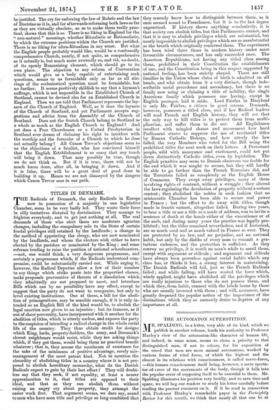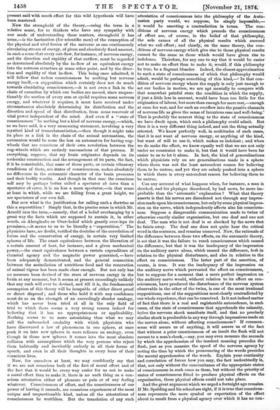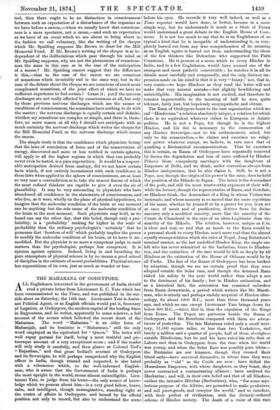THE AUTOMATON SUPERSTITION.
MR. SPALDLNG, in a letter, very able of its kind, which we publish in another column, lends his authority to Professor Huxley's view of the automaton-like character of human life, and indeed, in some sense, seems to claim a priority to that distinguished man, if not to others, for his exposition of the creed that men are mere animal automatons, worked by various forms of vital force, of which the highest and the closest in its relations with consciousness, is called nerve-force, —this human consciousness itself being, however, a mere specta- tor ab extra of the movements of the body, though it falls into the popular error of supposing itself to be essential to them. Mr. Spalding illustrates his position very lucidly, and to save time and space, we will beg our readers to study his letter carefully before reading the present comment on it. If it be read in connection with Professor Huxley's remarkable paper in the Fortnightly Review for this month, we think that nearly all that can be at
present said with much effect for this wild hypothesis will have been mastered.
Now the stronghold of the theory,—using the term in a relative sense, for to thinkers who have any sympathy with our mode of understanding these matters, stronghold it has none,—is the fascination (for scientific men) of the conception of the physical and vital forces of the universe as one continuously circulating stream of energy, of given and absolutely fixed amount, in such a sense that every out-flow, for instance, of nervous energy, and the direction and rapidity of that outflow, must be regarded as determined absolutely by the in-flow of an equivalent energy into the nervous structure at some other point, and by the direc- tion and rapidity of that in-flow. This being once admitted, it will follow that unless consciousness be nothing but nervous energy itself,—a supposition which certainly does not do much towards elucidating consciousness,—it is not even a link in the chain of causation by which our bodies are moved, since unques- tionably the motion of every arm or eyelid requires some nervous energy, and whatever it requires, it must have received under circumstances absolutely determining its distribution and the direction and speed of that distribution, from some reservoir of vital power independent of the mind. And even if a "state of consciousness" be nothing but a kind of nervous energy,—which, as we have said, is a very unmeaning statement, involving a very mystical kind of transubstantiation,—then though it might take its place as a link in the chain of the animal automatism, the automaton would be none the less an automaton for having cog- wheels that are conscious of their own revolution between the cog-wheels which are entirely unconscious of that process. If everything, suppose, that my brain originates depends on its molecular construction and the arrangement of its parts, the fact, if it be conceivable, that some of those parts, or certain vibratory conditions of them, are states of consciousness, makes absolutely no difference in the automatic character of the brain processes and their bodily results. And though in that case the conscious self may be perhaps better called a spectator ab intra than a spectator ab extra, it is no less a mere spectator,—in that sense at least in which, while we are falling from a great height, we are spectators of our own fall.
But now what is the justification for calling such a doctrine as this a superstition ? Simply that, in the precise sense in which Mr. Arnold uses the term,—namely, that of a belief overhanging by a great way the facts which are supposed to sustain it, in other words, an Aberglaube or Over-belief which greatly over-laps its premisses,—it seems to us to be literally a "superstition." The physicists have, no doubt, verified the doctrine of the correlation of forces and the conservation of energy, in certain very limited spheres of life. The exact equivalence between the liberation of a certain amount of heat, for instance, and a given mechanical power,—the exact equivalence between a certain expenditure of chemical agency and the magnetic power generated, —have been adequately demonstrated, and the general connection between the assimilation of nutritious food and the renovation of animal vigour has been made clear enough. But not only has no measure been devised of the store of nervous energy in the brain at any moment, but it seems at present exceedingly unlikely that any such will ever be devised, and till it is, the fundamental assumption of this theory will be incapable of either direct proof or direct disproof ; and those who hold it with any confidence must do so on the strength of an exceedingly slender analogy, which has never been tried at all in the only field of trial to which there seems a very strong reason indeed for believing that it has no appropriateness or applicability. Nothing seems to us more astonishing than what we may call the unbounded credulity with which physicists who have discovered a law of phenomena in one sphere, at once push it on into new spheres in mere reliance on analogy, even though in those new spheres it comes into the most absolute collision with assumptions which the very persons who reject them habitually and inevitably embody in all their forms of speech, and even in all their thoughts in every hour of their conscious lives.
Now, for ourselves at least, we may confidently say that if we are not conscious both of the fact of moral effort and of the fact that it would be every way easier for us not to make a moral effort than to make it, there is no such thing as a con- scious attestation either of pleasure or pain or of any feeling whatever. Consciousness of effort, and the consciousness of our power of leaving it unmade, are conscious experiences of the most unique and unquestionable kind, unless all the attestations of consciousness be worthless. But the translation of any such attestation of consciousness into the philosophy of the Auto- maton party would, we suppose, be simply impossible,— it would be asserting a contradiction in terms. The con- ditions of nervous energy which precede the consciousness of effort are, of course, in the belief of that philosophy, the sole causes of all the physical results which succeed what we call effort; and clearly, on the same theory, the con- ditions of nervous energy which give rise to those physical results cannot be the same as those which would have given rise to indolence. Therefore, for any one to say that it would be easier not to make an effort than to make it, would, if this philosophy be true, be a flagrant blunder. Indeed, the closest approximation to such a state of consciousness of which that philosophy would admit, would be perhaps something of this kind,—' In that con- dition of nervous energy where the supply is only just enough to set our bodies in motion, we are apt mentally to compare with that somewhat painful state the condition in which the supply, if just a little less in amount, would have been too little for the origination of labour, but more than enough for mere rest,—enough at once for rest, and for such an overflow into the passive channels of nervous life as gives the sense of luxurious ease and well-being.' That is probably the nearest thing to the state of consciousness we have dwelt upon, which such a philosophy could admit. But then it is a very different thing indeed, and not the thing actually attested. We know perfectly well, in multitudes of such cases, that it is not want of nervous energy, or anything of the kind, but want of will to use it, which makes us indolent ; and when we do make the effort, we know equally well that we are not only under no constraint to make it, but that it would have been far easier to us to let it alone. In fact, the kind of generalisations which physicists rely on are generalisations made in a sphere where there was not the least antecedent reason for believing them to be untrue, and yet they are calmly pushed into a sphere in which there is every antecedent reason for believing them to be untrue.
Can any account of what happens when, for instance, a man is shocked, and his physique disordered, by bad news, be more im- probable than the ' automatic ' explanation ? What that theory asserts is that his nerves are disordered not through any impres- sion made upon his consciousness, but only by some physical impres- sion on the nerve, which independently affects also his conscious- ness. Suppose a disagreeable communication made to twins of otherwise exactly similar organisation, but one deaf and one not deaf. The man who is not deaf is so shocked by the news that he faints away. The deaf one does not quite hear the critical word in the sentence, and remains unmoved. Now, the rationale of the difference between these two effects, on the automatic theory, is not that it was the failure to reach consciousness which caused the difference, but that it was the inadequacy of the impression on the auditory nerve alone, which caused the difference, both in relation to the physical disturbance, and also in relation to the effect on consciousness. The latter part of the assertion, of course, is true. It was the inadequacy of the impression on the auditory nerve which prevented the effect on consciousness, but to suppose for a moment that a more perfect impression on the auditory nerve would, without relation to its effect on con- sciousness, have produced the disturbance of the nervous system observable in the other of the twins, is one of the most irrational suppositions, one of the suppositions most clearly contradicted by our whole experience, that can be conceived. Is it not indeed matter of fact that there is a real and registerable antecedence, in such cases, of the state of consciousness that apprehends the calamity, before the nervous shock manifests itself, and that no precisely similar shock is producible in anyway through impressions made on the nerves alone, without affecting consciousness? If common- sense will assure us of anything, it will assure us of the fact that without a prior consciousness of an insult the flush will not mount to a man's cheek,—nay, you may even measure the seconds by which the apprehension of the insolent meaning precedes the flush, just as you measure the speed of the nervous agency by noting the time by which the pronouncing of the words precedes the mental apprehension of the words. Explain your continuity and correlation of forces how you may, the fact undoubtedly is, that, not only without the concomitance of the appropriate states of consciousness in such cases as these, but without the priority of states of consciousness fitted to produce physical effects on the organisation, those physical effects could not take place.
And the great argument which we urged a fortnight ago remains. If Mr. Spalding and his school are right, if it is true that conscious- ness represents the mere symbol or expectation of the effect about to result from a physical agency over which it has no con-
trol, then there ought to be no distinction in consciousness between such an expectation of a disturbance of the organism as we have before a sneeze,—when we usually, know that conscious- ness is a mere spectator, not a cause,--and such an expectation as we have of an event which we are about to bring about in the fashion we call voluntary, like the writing of the cheque which Mr. Spalding supposes Mr. Brown to draw for the Mill Memorial Fund. If Mr. Brown's writing of the cheque is as in- dependent of the deliberations which pass through his mind as Mr. Spalding supposes, why are not the phenomena of conscious- ness the same in this case as in the case of the anticipation of a sneeze? Mr. Spalding cannot suggest that the difference is this,—that in the case of the sneeze we are conscious of sensations which invariably end in the same way, but in the case of the debate about the cheque we are conscious of much more complicated sensations, of the joint effect of which we have no sufficient experience to feel certain? Grant it ; yet if the nervous discharges are not really affected by consciousness at all, but only by those previous nervous discharges which are the causes or conditions of consciousness, the sensations have nothing to do with the matter ; the nervous discharge is equally certain and definite, whether my sensations are complex or simple, and there is, there- fore, no more reason at all why I should not anticipate with as much certainty the nervous discharge which writes the cheque for the Mill Memorial Fund, as the nervous discharge which causes the sneeze.
The simple truth is that the confidence which physicists betray that the laws of correlation of force and of the conservation of energy, discovered and more or less verified in certain spheres, will apply to all the higher regions in which they can probably never even be tested, is a pure superstition. It would be a respect- able anticipation derived from analogy, did we not know certain facts which, if not entirely inconsistent with such confidence in these laws when applied in the sphere of consciousness, are at least so very near a contradiction as to take the utmost finesse of which the most refined thinkers are capable to give it even the air of plausibility. It may be very astounding to physicists who have abandoned all confidence in the statements of consciousness, and who live, as it were, wholly on the plane of physical hypotheses, to imagine that the molecular condition of the brain at one moment can be anything but the sole cause of the molecular condition of the brain at the next moment. Such physicists may hold, as we heard one say the other day, that this belief, though only a pro- bability, is a ' probability ' ranking far higher in the scale of probability than the ordinary psychologist's ' certainty ' that he possesses that 'freedom of will 'which probably implies the power to modify the molecular condition of his brain, or to leave it un- modified. But the physicist is no more a competent judge in such matters than the psychologist, perhaps less competent. It is opinion against opinion. Indeed, living in and breathing the pure atmosphere of physical science is by no means a good school of discipline in the estimate of moral probabilities. Physical science has superstitions of its own, just as much as wonder or fear.




































 Previous page
Previous page